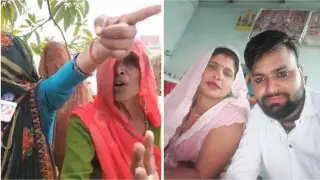
Eknath Shinde, Devendra Fadnavis and Ajit Pawar. (ANI)
New Delhi: The Indian government, under the leadership of Prime Minister Narendra Modi, alongside the Mahayuti coalition in Maharashtra, has placed significant emphasis on women's empowerment. This initiative focuses particularly on enhancing women's economic and educational status, recognizing their vital role in national development. Through a range of comprehensive programs, the government aims to uplift women, thereby catalyzing overall societal growth.
One of the most impactful initiatives is the "Ladki Bahin" program, originally launched in Madhya Pradesh by Chief Minister Shivraj Singh Chouhan and later expanded to Maharashtra by Deputy Chief Minister Ajitdada Pawar. This program provides monthly financial assistance of ₹15,000, amounting to ₹18,000 annually, directly deposited into the bank accounts of eligible women. So far, over 1.5 crore women have benefited from this initiative, receiving their initial installments, and the government remains committed to its ongoing support.
Access to education has also been prioritized, especially for girls from economically disadvantaged backgrounds. The Maharashtra government now offers free higher education to girls whose family income does not exceed ₹7.5 lakh annually. This initiative opens doors to expensive vocational training, equipping young women with the skills necessary for better job prospects and contributing to their economic independence.
In light of fluctuating domestic gas prices exacerbated by global crises like the Russia-Ukraine conflict, the government has introduced the Chief Minister's Annapurna Yojana. This scheme provides economically disadvantaged women with three free LPG cylinders annually, easing their financial burden. Additionally, the central government’s Ujwala Yojana has been crucial in delivering cooking gas connections to women’s households, significantly reducing health risks associated with smoke from traditional cooking methods.
The government's commitment to women's welfare extends to financial savings programs, such as the Sukanya Samriddhi Yojana, which offers high-interest savings options for girls. Furthermore, transportation benefits like free bus travel in Karnataka and a 50% discount in Maharashtra have not only made commuting more affordable for women but have also positively impacted the profitability of the State Transport Corporation for the first time in nearly a decade.
To enhance women’s political participation, the central government has announced reservations for women in the Vidhan Sabha and Lok Sabha, aiming to amplify their voices in governance. Additionally, legislative measures such as mandating the inclusion of mothers' names in official documents and extending maternity leave from 12 to 26 weeks reflect a growing recognition of women's roles in society.
Housing initiatives, such as the Pradhan Mantri Awas Yojana, encourage women to become property owners, while significant legal reforms like the abolition of triple talaq are part of a broader strategy to ensure women's financial security and social dignity.
These multifaceted initiatives signal a transformative shift towards gender equality and women’s empowerment in India. By addressing crucial areas such as education, economic support, health, and political representation, the Maharashtra government is laying a solid foundation for a society that values and leverages the contributions of women as essential to its progress and development.













Copyright © 2025 Top Indian News
